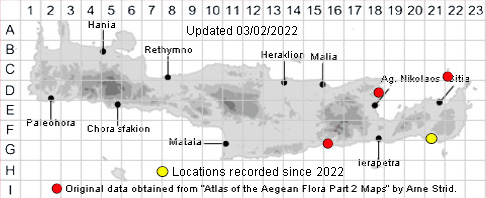
SPECIES DESCRIPTION
ALYSSUM STRIGOSUM
Family and Genus:- See- CRUCIFERAE/Sect. ALYSSUM
Common Name:- None
Homotypic Synonyms:- Alyssum campestre subsp. strigosum, Alyssum minus
subsp. strigosum, Alyssum minus var. strigosum.
Meaning:- Alyssum (Gr) Pacifier, ancient Greek name meaning without-fury -
alluding to the supposed medicinal properties against rabies.
Strigosum (L) Scraggy, thin. lank; with rigid hairs or bristles.
General description:- Annual or perennial, usually with yellow flowers, much
branched.
Stems:-
1) Up to 40 cm., covered in stellate hairs; erect and much branched.
Leaves:-
1) Alternate, elliptic-oblanceolate, the lower often absent at anthesis, with 6-8-
rayed, subappressed stellate hairs.
Flowers:-
1) In a raceme, elongating and cylindrical in fruit.
2) Petals, c. 2.5 mm, spathulate, deeply emarginate to bifid, pale yellow.
3) Sepals, 1·5-2·5 mm, caducous.
4) Pedicels, 3-6 mm, erecto-patent.
5) Filaments, of the short stamens 1·5-2·5 mm, with connate appendages.
6) Nectaries, 0·1 mm.
7) Style, 0.5-1 mm, minutely stellate-pubescent.
Fruit:-
1) Silicula, 3·5-6 mm, suborbicular, pubescent; usually with dimorphic indumentum
of bifurcate, strigose hairs in addition to stellate hairs, valves inflated, with a
flattened margin.
2) Seeds, 1·7-2 mm; wing up to 0·4 mm wide.
Key features:-
1) Siliculae, usually with bifurcate, strigose hairs in addition to stellate hairs.
2) Petals, deeply emarginate to bifid.
3) Style, glabrous.
Habitat:- Rocky places, dry open shrubby vegetation, olive groves, fallow fields and
wasteground, mainly on limestone. 0-800 m.
Distribution:- Throughout Peloponnisos and mainland Greece, but rare in the west.
- Widespread in the Mediterranean region and SW Asia. Rare on Crete known from
only a few locations in the east.
Flowering time:- Mar-May(-June).
Photos by:- Courtesy of Wiki-Commons

Native to:
Afghanistan, Albania, Bulgaria, Cyprus, East Aegean Is., Greece, Iran, Iraq, Italy, Kriti, Lebanon-Syria, North Caucasus, Palestine, Romania, Transcaucasus, Turkey, Turkey-in-Europe, Yugoslavia
Introduced into:
California
Afghanistan, Albania, Bulgaria, Cyprus, East Aegean Is., Greece, Iran, Iraq, Italy, Kriti, Lebanon-Syria, North Caucasus, Palestine, Romania, Transcaucasus, Turkey, Turkey-in-Europe, Yugoslavia
Introduced into:
California

Introduced


Native
GLOBAL DISTRIBUTION